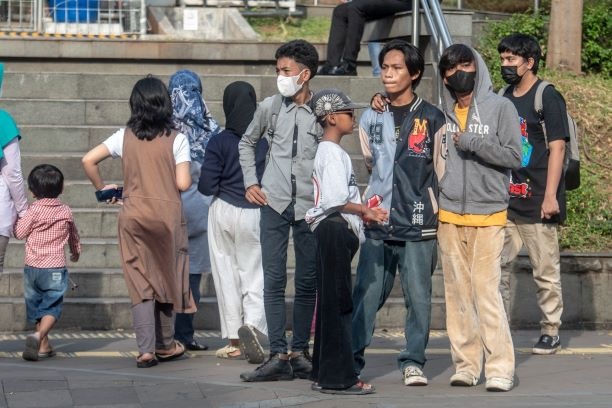Popular Reads
Top Results
Can't find what you're looking for?
View all search resultsPopular Reads
Top Results
Can't find what you're looking for?
View all search resultsJakarta feels COVID-19 pinch as calls grow to tighten curbs
Health experts are calling on the government to tighten public restrictions in Greater Jakarta amid growing complacency as COVID-19 numbers continue to rise.
Change text size
Gift Premium Articles
to Anyone
J
o:p>Jakarta, once again the epicenter of the latest COVID-19 wave in the country, has seen a sharp rise in the week’s caseload to a level not seen in months, which has sparked calls for tighter controls.
The capital, currently under the lowest level of the four-tier public activity restrictions (PPKM), is seeing a concerning increase in new cases fueled by the fast-spreading Omicron subvariants BA.4, BA.5 and BA.2.75.
Since the fourth and latest coronavirus wave started at the beginning of June, Jakarta has been steadily contributing roughly 50 percent of all new cases detected nationwide. Some 23,000 out of the country’s 46,000 active cases had been reported in the capital as of July 27 and it reported 3,279 new COVID-19 cases on Wednesday alone, the highest since March 10.
The nation’s weekly figure has increased around 25 percent from 14,700 to 18,500 cases.
Meanwhile, the positivity rate for the capital has increased more than threefold in the past month to 17 percent, more than triple the 5 percent threshold of the World Health Organization (WHO).
Although the Omicron subvariants are reportedly less likely to make people sick or cause severe illness, hospitalization for COVID-19 has steadily risen across the capital. The bed occupancy rate has increased 45 percent over the past month to 12 percent, nearly three times the national average of 4.6 percent.
Lax restrictions
Despite the increasing caseload, the government has been adamant about maintaining PPKM level 1 across the capital until August.
Earlier this month, the government made an about-face in its plans to tighten COVID-19 curbs in Greater Jakarta, reverting the region to PPKM level 1 the day after it issued an instruction to raise it to level 2.
Under PPKM level 2, offices, houses of worship, shopping malls, public facilities, movie theaters and hotels may operate at 75 percent capacity, while wedding venues may operate at 50 percent capacity. PPKM level 1 allows all public establishments to operate at 100 percent capacity.
The Home Ministry’s director general of regional administration development, Safrizal Z.A., said on July 6 that the decision was connected to the government’s belief that Greater Jakarta had passed the peak of the current wave of infections.
“Even though based on epidemiological assessments Greater Jakarta should fall under level 2 for COVID-19 community transmissions, [...] we believe the area will return to level 1 in a week or two,” Safrizal said in a statement.
He cited low hospitalization and fatality rates, ongoing efforts to recover the economy and the duration of the PPKM as reasons for backpedaling on the restrictions for the urban agglomeration area.
His statement came just days ahead of the Muslim holiday Idul Adha, which fell on July 10, when congregational prayers and large gatherings were expected.
Contrary to the government’s “belief”, however, the COVID-19 caseload has continued to rise in Greater Jakarta. On July 13, the WHO published a situation report recommending that Jakarta be rated community transmission level 3 for high COVID-19 incidence.
The government predicted earlier that the fourth wave of transmission, initially fueled by the BA.4 and BA.5 subvariants, would peak by the second or third week of July. But last week’s detection of the BA.2.75 subvariant prompted authorities to revise the projection, saying that the current wave was very likely to last longer than expected.
Enforcing protocols
Health experts have been calling on the government to tighten the curbs in the capital.
Windhu Purnomo, an epidemiologist at Airlangga University (UNAIR), said the government should not have backtracked on its decision to impose PPKM level 2 on Greater Jakarta.
“Based on the WHO indicators, Jakarta’s COVID-19 caseload this week has reached level 4 in community transmission, denoting very high incidence. Although hospitalizations are relatively low compared to previous waves, bed occupancy rates in the capital city have also reached level 2," Windhu told The Jakarta Post on Thursday.
“Although it is not something that should cause us to panic, we should not be lowering our guard against the virus, either. I hope that next month, the government will tighten the restrictions in Greater Jakarta to PPKM level 3 or at least PPKM level 2,” he said.
Epidemiologist Dicky Budiman of Australia’s Griffith University concurred, highlighting the importance of taking stringent measures alongside the health protocols to curb the spread of the virus.
“The most important thing is to not just change the PPKM status between levels 1, 2 or 3, but enforcing the COVID-19 rules for the public. Lately, there have been a lot of crowd-pulling events in Jakarta where many people did not mask up, and local authorities seemed to ignore it,” he said.










